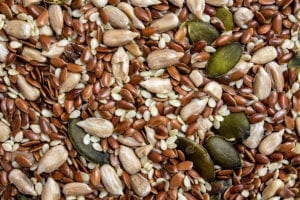You’ve probably experienced it because we hear women frustrated and distressed about weight gain all the time. And they’re not imagining it, it’s very real and what used to work for you may not work now. What’s more, this weight gain is accelerated during menopause as the balance of hormones shifts but not just sex hormones, there’s a lot going on.
Studies have shown that on average women gain between 6 and 7.5kg of weight between the age of 35 and 55 years.
What’s more, many women feel like they can’t lose fat no matter how well they eat and exercise. In fact, the extra stress of trying too hard to lose weight will further upset the levels of hormones, especially the stress hormone cortisol. This leads to more fat deposits and weight gain. Yep, it can become a vicious cycle.
So how do you make weight gain stop?
It’s a valid question and I’m here to tell you it can be done. Phew, right? A lot of it’s to do with the magical female sex hormones which play a major role in fat distribution. Indeed, it’s estrogen that distributes body fat to create the classic female shape and estrogen loves fat.
But it’s very important to get a handle on sleep and stress before you even think about food. That might be a bit of a surprise but if you’re not sleeping, if you’re very stressed you won’t lose weight. Plus, if you over-exercise (yes, you can) and eat the wrong types of food at the wrong time you may also feel your jeans get tighter.
The trick is to have enough fat to be healthy, but not so much that you become susceptible to diseases associated with being overweight including;
- obesity
- high blood pressure
- dyslipidemia (blood lipids and cholesterol)
- insulin resistance
These are collectively known as metabolic syndrome and can lead to:
- cardiovascular disease
- diabetes
- inflammation
- liver and kidney damage
For this reason, there are lots of good reasons to maintain a healthy body weight and a great looking shape.
But it’s not all about estrogen. Progesterone and cortisol play a significant part in fat metabolism as well. The key to controlling weight gain during menopause is balance:
- supported hormone levels
- a nutrient profile that’s heavy on plants, lean proteins, whole grains and health fats a la the Mediterranean style of eating
- a lifestyle that prioritises you
The first way to manage weight gain? Support your hormone levels
Supporting your hormones include estrogen, progesterone, androgens, insulin, cortisol and the thyroid.
So if unwanted weight gain during menopause is something you’re experiencing then the first and easiest thing to do is work on your lifestyle: focus on sleep, stress, nutrients and movement and of course the direct hormonal shifts of menopause which is wheree we come in.










